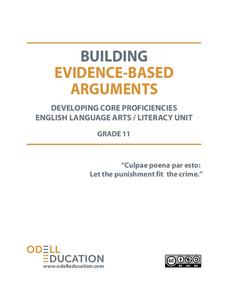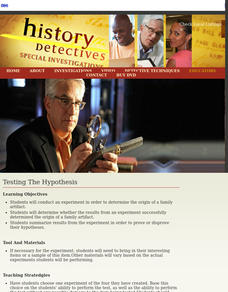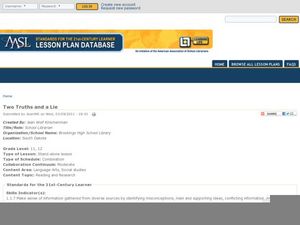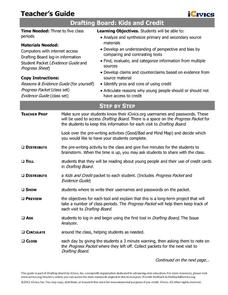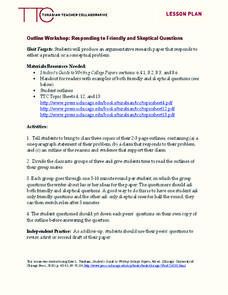Odell Education
Building Evidence-Based Arguments: "Cuplae poena par esto: Let the punishment fit the crime."
Should a criminal's punishment match the crime? An argumentative writing plan explores this question as class members investigate a variety of mixed-medium sources by experts in the field, form evidence-based claims, and support them...
Odell Education
Making Evidence-Based Claims: "The Souls of Black Folk" by W.E.B. Du Bois
Scholars dig deep into the text of W.E.B. Du Bois The Souls of Black Folk and analyze his position that black people must be aware of how they see themselves as well as how the world sees them. The instructor and readers work through the...
K20 LEARN
Arguing With Evidence: Deconstructing Arguments Part 1
In the first lesson in a two-part series, high schoolers pick a social issue important to them and examine an article about the topic, the arguments and evidence used to support the writer's stance, and craft two counter-arguments to the...
Curated OER
Is That a Fact?
Investigate popular scientific claims and gather evidence to defend or argue against an author's stance. Writers synthesize information and compose their own "Really?" columns modeled after those found in the weekly "Science Times"...
Curated OER
Be That As It Maya
Creative projects are a great way to engage your class and can be a fun way to assess mastery! Learners create brochures and postcards that might have been created by and for travelers to ancient Mayan cities. They read and discuss the...
Polk Bros Foundation
Answer the BIG Question with Cited Examples and Evidence
Close up your unit of study with an examination of one of the guiding or essential questions as it relates to what your class has studied and other research. Class members first write down the question. Then they note down information...
Curated OER
Truth Be Told
Encourage your middle and high schoolers to share their memories of a recent event. After reading a New York Times article, they discuss Elie Wiesel's memoir, Night. They write their own memoir about a significant event that affected...
PBS
Testing The Hypothesis
After choosing one experiment from the four they conducted in the previous lesson, young investigators analyze the evidence they collected to determine if it proves or disproves their original hypothesis.
K20 LEARN
Argument Is Everywhere: Introduction to Argument
C.E.R = Claim + Evidence + Reasoning. That's the framework behind building a solid piece of argument writing. Introduce young writers to this format with an engaging lesson that uses YouTube videos and a PowerPoint to illustrate the...
Odell Education
Reading Closely for Textual Details: Grade 12
Help your class examine humanity's unpredictable nature through "Life Steps Almost Straight." Learners read various works from philosophers such as Viktor Frankl, The Buddha, and Nietzsche to gather textual evidence and explain their...
Polk Bros Foundation
I Can Identify a Nonfiction Writer's Main Idea and Supporting Examples
Use this page to quickly identify the central idea of a text and organize ideas for writing an informational or explanatory text. The worksheet is split into two parts. In the first part, pupils note down the main idea and supporting...
Curated OER
American Dream and The Great Gatsby
Is the American Dream alive and well or has it dried up and died? As part of a study of The Great Gatsby, class members search for articles on the state of the American Dream, analyze the arguments presented in those articles, and then...
iCivics
Drafting Board: Electoral College
Should the president of the United States be voted by the Electoral College or the popular vote? Your young historians will consider the pros and cons of the Electoral College, and make an argument using reasons and evidence provided in...
iCivics
Drafting Board: Community Service
Should schools impose community service graduation requirements? In the final lesson of the Drafting Board series, learners solidify their practice of crafting an argument supported by sound reason and evidence.
iCivics
We the Jury
Learners take on the roles of jurors in a civil case to evaluate evidence and determine a verdict in this engaging online interactive experience.
Texas Education Agency (TEA)
Drawing Conclusions Based on the Sufficiency and Strength of Research (English III Reading)
High school juniors learn how to construct a strong argument by crafting a claim and using neutral language backed by evidence from reliable sources. To do so, they learn to evaluate sources and evidence to support claims. They then...
Curated OER
Two Truths and a Lie: Internet Research Skills
It's tough for high schoolers to assess what is a credible resource and what is not. A helpful resource prompts class members to research a particular topic and record two facts—and create one lie—while documenting the sources. They then...
iCivics
Drafting Board: Kids and Credit
Should kids under the age of 18 be given access to credit cards? Learners identify pros and cons of using credit, develop claims based on evidence, and finally argue reasons for or against credit for minors.
Turabian Teacher Collaborative
Outline Workshop: Responding to Friendly and Skeptical Questions
Answering questions is the best way to hone and revise your argument. Foster receptive writers with a workshop activity that promotes peer editing and argumentative writing skills. Given lists of both friendly and skeptical questions,...
PBS
Predicting/Making a Hypothesis
As an introduction to the hypothesis and testing method of investigation, young history detectives engage in a special investigation of a family artifact. After watching a short video that demonstrates the method, they develop a...
Newseum
Civil Rights: Knowns and Unknowns
Class members generate a list of research questions to review the civil rights movement and determine what scholars still need to learn. Groups then select a different compelling question, create a hypothesis and find evidence to support...
Texas Education Agency (TEA)
Distinguishing Between Inductive and Deductive Reasoning (English III Reading)
Is Sherlock Holmes an inductivist or a deductivist? Users of this interactive to distinguish between inductive and deductive reasoning. They consider in various situations whether it is better to list evidence and then introduce a claim...
Curated OER
End-of-Year Practice Test (Grade 11 ELA/Literacy)
Set up a solid foundation for learners going into Common Core testing by taking some time to complete this practice test. Class members answer questions about both literary and informational texts, with an emphasis on textual evidence....
News Literacy Project
Get Smart About COVID-19
Pandemic or infodemic? Scholars complete an online quiz to determine if they can sort fact from fiction related to COVID-19 information. Pupils view a variety of news articles, social media posts, and video clips to practice identifying...
Other popular searches
- Evidence of Evolution
- Evidence for Evolution
- Citing Textual Evidence
- Textual Evidence
- Evidence for Plate Tectonics
- Supporting Evidence
- Continental Drift Evidence
- Archaeological Evidence
- Dna Evidence for Evolution
- Cite Evidence in Text
- Evidence for Geologic Time
- Indirect Evidence


